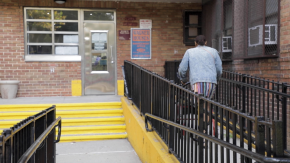
As the nationwide shortage of stable, affordable housing has come into sharp relief, an important question is ringing out in cities and neighborhoods across the country: How can we help people stay in the homes they already have?
Eviction destabilizes life for millions of families each year, most of all in communities that have historically been marginalized. One in five renters at risk of eviction are Black women, who also face unequal pay and caregiving responsibilities.
“Our typical client is a female head of household with multiple children—which means the average person being evicted is a child,” says Yaniris Gomez of our Newark Community Solutions team, which has been working to keep Essex County residents in their homes. “And that’s true across the board in this country.”
To address that destructive trend, our housing team in Newark takes a three-pronged approach to preventing evictions: getting people emergency relief, increasing access to legal counsel and educating tenants on their rights, and connecting residents to broader services that help build stability.
Stable housing is a basic need in its own right, but it’s also a stepping stone to well-being across all aspects of life: school, work, health, family, and community responsibilities. Preventing an eviction means preserving countless things that make for safe, thriving families and neighborhoods.
Most eviction cases in Essex County—which includes the City of Newark— are brought against people struggling to make their rent. To date, our Newark team has distributed over $500,000 in emergency relief for people behind on rent payments with support from New Jersey’s Department of Community Affairs. That includes people who have a hard time getting relief under typical rental assistance programs, like residents of public housing.
Many tenants facing eviction confront a civil legal system that too often sets them up for failure. The vast majority of people at risk of eviction go into housing court without a lawyer, while their landlords are nearly always represented. Due to the shortcomings of Gideon, the right to counsel isn’t recognized in civil cases, including in housing court, where someone’s right to remain in their home is at stake.
That’s why our Newark team has deepened its partnerships with legal service providers—like Volunteer Lawyers for Justice and the Community Health Law Project—to increase people’s access to counsel, which can lead to higher odds of preventing unnecessary, and sometimes even unlawful, evictions. Social workers with the team also help address the imbalance of power between tenants and landlords in housing court by teaching residents about their rights and guiding them through the ins and outs of the civil legal system.
While preventing an impending eviction is the immediate goal, we also work with residents to ensure they can stay safely housed in the long run. Our case managers guide people through the process of getting access to public benefits for food and health care, alleviating costs that they might otherwise pay out of pocket. We also make connections to housing counselors, who can help tenants with budgeting, managing their bills, and paying rent on time. In some cases, the team even puts people in touch with services for mental health needs, which can both contribute to and be exacerbated by housing insecurity.
Many people who get access to these services only find out about them when eviction is imminent, after they’ve been told to vacate. Ensuring people can get this critical support earlier—before the point of an emergency—would help many more people and families remain in their homes and in touch with the economic opportunities, relationships, and community ties they need to flourish in all aspects of life.
The human costs of evictions are vast, especially for families and communities of color. But even modest investments in eviction diversion can prevent countless harms—from the trauma of displacement, to the downstream consequences of job loss, long-term health challenges for children, and even more barriers to finding stable housing down the line. By providing immediate relief while working towards more lasting stability, we can lay the groundwork for safer, more just communities for all.

